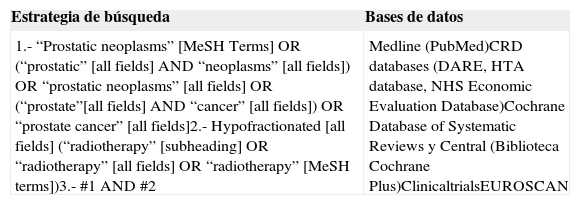Nuevas alternativas terapéuticas pueden mejorar la eficacia y seguridad del tratamiento del cáncer de próstata.
ObjetivoEvaluar si la radioterapia hipofraccionada conlleva mejor eficacia y seguridad en el tratamiento del cáncer de próstata.
Adquisición de la evidenciaRevisión sistemática de la literatura con búsqueda en Pubmed, Cochrane Libarry, CRD, ClinicalTrials y Euroscan, recogiéndose indicadores de efectividad y seguridad.
Síntesis de la evidenciaSe incluyeron 2 revisiones sistemáticas y un ensayo clínico. En relación con la eficacia existe una gran heterogeneidad entre los estudios, y no se encuentran resultados concluyentes de la superioridad de la opción hipofraccionada sobre la normofraccionada. En relación con la seguridad no se encuentran diferencias significativas en la aparición de complicaciones genitourinarias agudas entre ambos tratamientos. Sin embargo, una de las revisiones encuentra más complicaciones gastrointestinales agudas en los pacientes tratados con radioterapia hipofraccionada. En las complicaciones a largo plazo no se encuentran diferencias significativas según el tipo de radioterapia utilizada, aunque los estudios presentan limitaciones.
ConclusionesHasta el momento no existen resultados concluyentes que demuestren que la radioterapia hipofraccionada es más eficaz o segura que la normofraccionada en el tratamiento del cáncer de próstata localizado.
New therapeutic alternatives can improve the safety and efficacy of prostate cancer treatment.
ObjectivesTo assess whether hypofractionated radiation therapy results in better safety and efficacy in the treatment of prostate cancer.
Acquisition of evidenceSystematic review of the literature through searches on PubMed, Cochrane Library, CRD, ClinicalTrials and EuroScan, collecting indicators of safety and efficacy.
Synthesis of the evidenceWe included 2 systematic reviews and a clinical trial. In terms of efficacy, there is considerable heterogeneity among the studies, and no conclusive results were found concerning the superiority of the hypofractionated option over the normal fractionated option. In terms of safety, there were no significant differences in the onset of acute genitourinary complications between the 2 treatments. However, one of the reviews found more acute gastrointestinal complications in patients treated with hypofractionated radiation therapy. There were no significant differences in long-term complications based on the type of radiation therapy used, although the studies did have limitations.
ConclusionsTo date, there are no conclusive results that show that hypofractionated radiation therapy is more effective or safer than normal fractionated radiation therapy in the treatment of localized prostate cancer.
Artículo
Comprando el artículo el PDF del mismo podrá ser descargado
Precio 19,34 €
Comprar ahora














